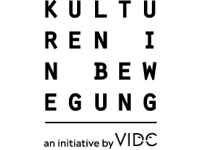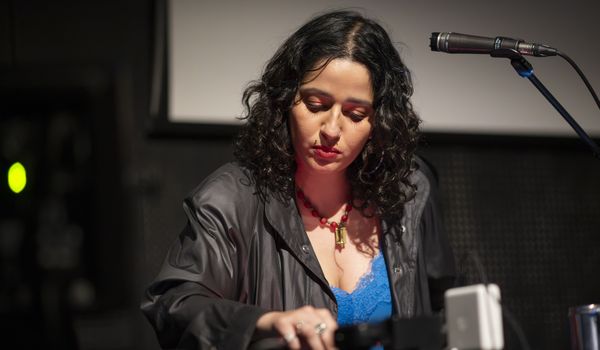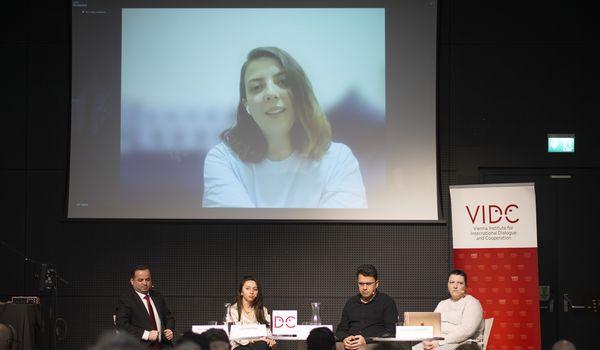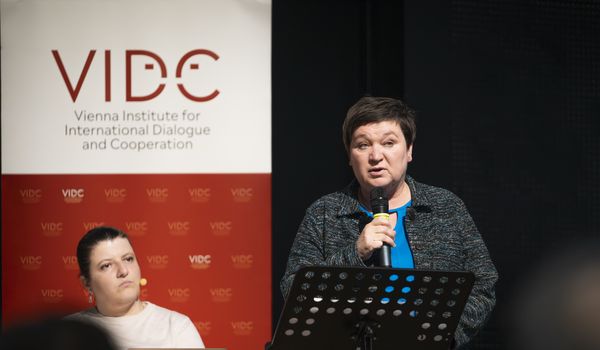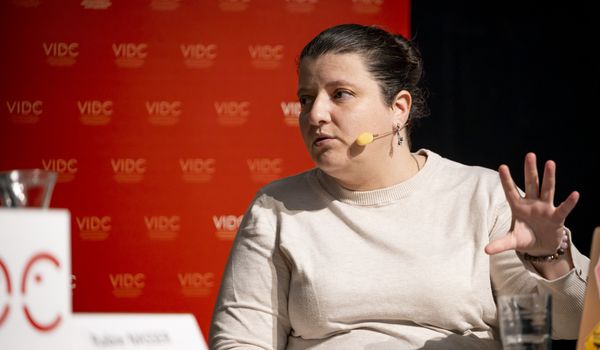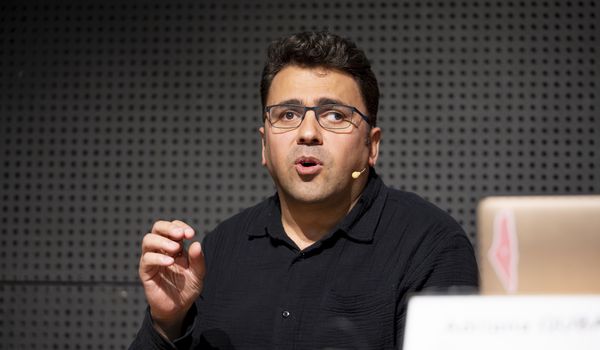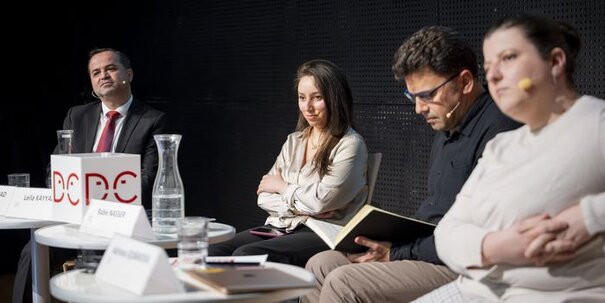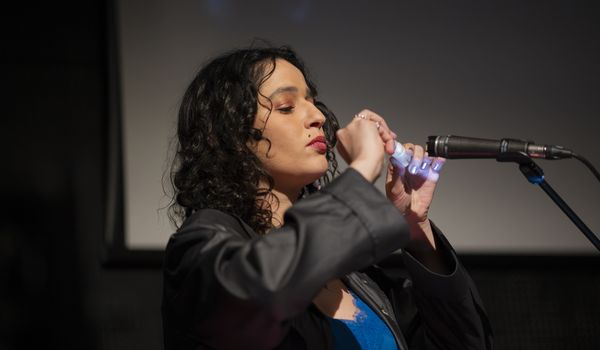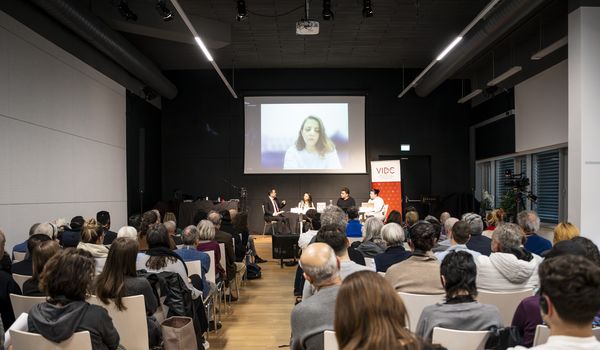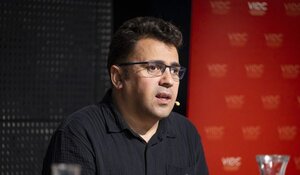On April 10, 2025, the VIDC hosted a panel discussion on Syria’s future following the fall of the Assad regime. The discussion was moderated by Adriana Qubaiova (Central European University) and featured Syrian experts from various disciplines, including one participant joining live from within Syria. The panel brought together: Leila Kayyali, political scientist and co-founder of the Change for Syria Network, Rabie Nasser, economist and researcher at the Syrian Center for Policy Research, Bassam Alahmad, human rights defender and director of Syrians for Truth and Justice and Wajiha Talal Hajar, lawyer and director of Baladi, speaking from inside Syria.
Reflections on the Fall of Assad
The panel opened with reflections on the collapse of Bashar al-Assad’s regime in December 2024, ending more than five decades of authoritarian rule of the Baath Party. While widely seen as a historic milestone, emotions among Syrians were complex. The country witnessed widespread celebrations and parties in the streets. However, the atmosphere was charged with grief over what the people had lost during past years, and deep uncertainty about the country’s next chapter.
Leila Kayyali expressed mixed feelings—euphoria over Assad fleeing to Moscow, but concern over Hay’at Tahrir al-Sham’s (HTS) growing control. She said, “The fall of the regime refreshed our memory and our sense of belonging to Syria,” but warned of the many challenges ahead, including destroyed infrastructure, missing persons, and six million children without access to education.
Rabie Nasser described the transfer of power as a “clean transition,” particularly in Aleppo, where HTS restored services and avoided widespread reprisals. However, he cautioned against misinterpreting this as a sign of legitimacy, arguing that HTS’s dominance was being mistaken for authority. “HTS is not representing the future,” he noted, stressing that real power must be based on inclusion, not military control.
Bassam Alahmad, a former political prisoner, shared a complex emotional response. “Of course I celebrated his fall, but my dream was not only to remove Assad—it was to build democracy in Syria,” he said. He warned that HTS’s ideology, openly hostile to democracy, was incompatible with the aspirations of the revolution that started in 2011.
Wajiha Hajjar, joining from Syria, reflected on the emotional intensity of the moment and emphasized her sense of duty moving forward. She strongly emphasized that violence should never be met with more violence and called for justice to be pursued through legal institutions and courts.
National Dialogue and Constitutional Declaration
Panelists widely agreed that the much-anticipated national dialogue conference in February 2025 fell short of expectations.
Rabie Nasser criticized the process as exclusive and controlled by armed factions, saying it failed to include civil society or political actors. Negotiations had been conducted primarily with armed factions, not with those capable of contributing to a long-term political solution.
The national dialogue conference, he stressed, was a missed opportunity to shift from the logic of war to a foundation for peace.
“We replaced one-man rule with another,” he warned, referring to the newly drafted constitutional declaration that centralized power even more than under Assad. Bassam Alahmad emphasized “Dialogue isn't about agreeing—it’s about confronting disagreement openly,” he said, lamenting that the process was symbolic rather than substantive. Wajiha Hajar described that the conference dialogue was a big disappointment, and the constitutional declaration is the first step to establish a new dictatorship “Instead of Sharia, the Universal Declaration of Human Rights should be the first source for legislation.”.
In the panel discussion, Rabie Nasser expressed deep concern about the rise of identity politics in post-Assad Syria, particularly the increasing tendency to frame public discourse around sectarian and ethnic identities rather than shared citizenship. He warned that officials and public figures had started referring to people as "Sunnis" or "minorities," which he saw as a dangerous shift. According to Nasser, this kind of rhetoric fuels social fragmentation and undermines the possibility of building national unity and trust.
Massacres and Human Rights Concerns
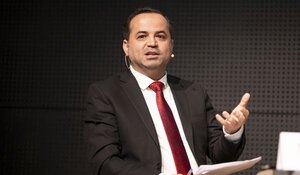
Bassam Alahmad raised alarm over the massacres that occurred in Latakia and Tartus in March 2025, where over 1,700 people—mostly Alawites—were killed in less than 48 hours. His documentation team found evidence suggesting the killings were systematic and carried out in revenge, with elements pointing to genocide stating that the current government still has not moved to act as a state but still has the mindset of a terrorist organization. “They are telling the West what they want to hear,” he said, criticizing the gap between official narratives and the reality on the ground.
Wajiha Hajar emphasized the importance of acknowledging crimes committed against civilians especially women and children—victims who were not involved in violence. She stressed the need for a credible truth-finding commission, while also expressing doubt about the current body’s independence. “Violence should never be met with more violence, but with inclusive justice,” she said.
Regional Dynamics and Foreign Influence
Rabie Nasser placed Syria’s crisis within a broader regional context. He traced the collapse of governance across the Middle East to key events like the U.S. invasion of Iraq and Israeli military aggression, which paved the way for armed groups to claim authority under the guise of resistance. HTS, he argued, is part of this trend—backed or tolerated by actors such as Turkey, and the Gulf states.
Turning back to Syria, he warned that what appeared to be a transitional period has hardened into a longer-term political reality Rabie Nasser warned that HTS’s dominance is being mistaken for authority. "You're not strong enough to say, ‘It’s us who controls the country," he argued. True power, in his view, requires inclusivity, not just military presence. Instead of building a representative political process, HTS had centralized power and excluded critical actors—particularly political parties and civil society.
Leila Kayyali expressed concern over the role of external powers, particularly Turkey and Israel. She described Syria as a “playground for global powers,” calling for a renewed sense of national independence.
Gender Perspective and Missed Opportunities

Leila Kayyali also addressed women’s political exclusion. She criticized both the Assad regime’s tokenism and the current government’s near-total exclusion of women, despite their key role in the revolution. She called for genuine representation moving forward.
Transitional Justice and Accountability
Panelists emphasized the importance of timely beginning transitional justice process as a foundation for a peaceful future.
Bassam Alahmad criticized the government’s opaque handling of alleged war criminals, noting that Syrian law doesn’t recognize international crimes like war crimes or crimes against humanity. He also expressed disappointment in the government’s failure to engage meaningfully with international bodies such as the UN’s Commission of Inquiry and the International, Impartial and Independent Mechanism (IIIM).
Rabie Nasser added that justice must be linked with economic policy and social inclusion. He warned of rising inequality under current economic reforms, which he described as dangerously neoliberal and detached from people's needs.
Looking Ahead: An Inclusive Syria
In their closing remarks, panelists reflected on what it would take to rebuild a just and inclusive Syria. Leila Kayyali called for stronger ties between the Syrian diaspora and communities inside the country. She emphasized that exiled professionals and activists could contribute valuable knowledge and accountability mechanisms to the transition process. Wajiha Hajar echoed this, stating, “Now is the time to work. Civil society has delivered essential services—but there is no legal ground for their engagement. Diaspora organizations can help transfer experience and knowledge back to Syria.” Bassam Alahmad urged inclusive participation in shaping Syria’s future, referencing UN Security Council Resolution 2254 as a guiding framework. Rabie Nasser concluded with cautious optimism: “Extremism never works. Both people and the authorities must learn from the past. Real dialogue can build understanding and generate pressure for peace.”

